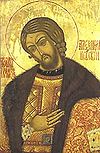- Metropolitan Vladimir of Kiev
-
 Vladimir, Metropolitan of Moscow.
Vladimir, Metropolitan of Moscow.
Vladimir (Russian: Владимир); baptismal name: Vasily Nikiforovich Bogoyavlensky (Russian: Василий Никифорович Богоявленский; 1 January 1848 - 7 February [O.S. January 25] 1918) was Metropolitan of Kiev and Gallich (1915–1918), Metropolitan of Moscow (1898–1912).
Born to a family of a clergyman in Tambov, Vasili Bogoyavlensky graduated from a seminary in Tambov and Kiev Theological Academy. He then returned to Tambov to teach at his alma mater. In 1882, Vasili was ordained a priest in a town of Kozlov in Tambov Guberniya. On the death of his wife and child in 1886, he was tonsured (took monastic vows) being given the religious name of Vladimir, and was appointed igumen (abbot) of the Trinity Monastery in that same town.
In 1888, Igumen Vladimir was sent to St Petersburg as a vicar to assist the metropolitan and was thereafter consecrated bishop. He was soon assigned to preach in Samara and then Georgia, where he would spend five years. In 1898, Bishop Vladimir was summoned to Moscow where he was appointed Metropolitan of Moscow. During the events of October 1905, Metropolitan Vladimir wrote an address entitled, "What should we do during these troubled days?" (Что нам делать в эти тревожные наши дни?) and ordered that it be read aloud to the people in all of the churches in and around Moscow. In this address, he told the people of Moscow about the "criminal" and "anti-Christian" intentions of those who had compiled The Protocols of the Elders of Zion. Metropolitan Vladimir's address made a huge impression on those who confessed Russian Orthodoxy. He himself read his speech in the Assumption Cathedral of the Moscow Kremlin. Assessing the Protocols, Vladimir directly associated its authors' "monstrous" intentions with the revolutionary events in Russia, examining the then-ongoing social disturbance in the Russian society from a religious, not political, point of view. He urged the Orthodox people to stand up against the Anti-Christ.
Upon the death of the Metropolitan Anthony of Saint Petersburg in 1912, Metropolitan Vladimir was chosen to fill this post. His successful career in this city, however, came to an end because he had been criticising Grigori Rasputin.[citation needed]
In December 1915, Vladimir was sent away to Kiev. Was Metropolitan of Kiev and Gallich from 1915 to 1918. A few months after the October Revolution, Metropolitan Vladimir was arrested by five Red Army soldiers on 7 February [O.S. January 25] 1918, in front of his monks and immediately executed.
Metropolitan Vladimir was glorified (canonized) as a saint by the Russian Orthodox Church on October 4, 1998. His feast day is celebrated on January 25, the date of his martyrdom. The Russian Orthodox Church follows the traditional Julian Calendar in determining feast day; currently, January 25 falls on February 7 of the modern Gregorian Calendar. He was the first bishop to suffer as a New Martyr under the Soviets.
References
External links
- St Vladimir, Metropolitan of Kiev and Gallich Orthodox icon and synaxarion
- ВЛАДИМИР (Богоявленский), священномученик, митрополит Киевский и Галицкий
Preceded by
Flavian (Gorodetsky)Metropolitan of Kiev and Gallich
1915–1918Succeeded by
Antony (Khrapovitsky)People from Russia Leaders and religious - Pre-1168
- 1168–1917
- 1922–1991
- 1991–present
- RSFSR leaders
- General secretaries
- Soviet premiers (1st deputies)
- Soviet heads of state (and their spouses)
- Prime ministers (1st deputies)
- Foreign ministers
- Prosecutors general
- Metropolitans and patriarchs
- Saints

Military and explorers - Field marshals
- Soviet marshals
- Admirals
- Aviators
- Cosmonauts
Scientists and inventors - Aerospace engineers
- Astronomers and astrophysicists
- Biologists
- Chemists
- Earth scientists
- Electrical engineers
- IT developers
- Linguists and philologists
- Mathematicians
- Naval engineers
- Physicians and psychologists
- Physicists
- Weaponry makers
Artists and writers Sportspeople Chess playersCategories:- 20th-century Christian saints
- Metropolitans and Patriarchs of Moscow
- Eastern Orthodox metropolitans
- Eastern Orthodox missionaries
- Russian saints
- 1848 births
- 1918 deaths
- Russian Orthodox Christians
- Eastern Orthodox Christians from Russia
- Martyrs
- Metropolitan bishops
- Russian monarchists
- 20th-century Eastern Orthodox martyrs
- Burials at the Far Caves, Kiev Pechersk Lavra
- Murdered priests
Wikimedia Foundation. 2010.
